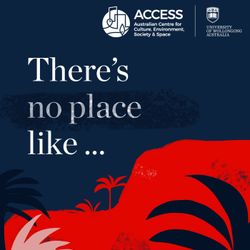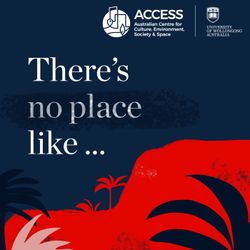There's no place like ...
All Episodes

2. Entanglements - Jenny Atchison - Urban Trees
01:05:55||Season 2, Ep. 2Melbourne City Council assigned email addresses to the 70 000 urban trees living in the city so that the public could email the council any maintenance concerns abou th tetrees. But to the surprise of council workers the emails the trees received were surprisingly personal and even affectionate, with people expressing their gratitude and love for their local trees.In this latest Entanglements lecture, Dr Jenny Atchison a geographer with ACCESS has been part of a unique research project with social sciences and arts researchers at Melbourne Uni and the City of Melbourne. The project involved reading the emails and studying the data to consider how people living in Melbourne feel about the trees. But importantly, the project is also looking at how the city's urban forest can be made more resilient in the face of climate change and an ageing tree population. This episode was recorded live at the Wollongong Art Gallery on June 3, 2021.
1. Entanglements - Chris Gibson + Andrew Warren - The Guitar
01:07:40||Season 2, Ep. 1Guitars are now the world’s most popular musical instrument and an aficionado can tell you precisely when and where their favourite instrument was made, the wood that it’s made from, and how that wood affects the sound of the instrument. So what happens when two human geographers decide to follow that fascination around the globe and trace guitars all the way back to the tree? In this Entanglements lecture series recorded live at the Wollongong Art Gallery, Professor Chris Gibson and Dr Andrew Warren from ACCESS at UOW talk about their 6 year research quest to follow the instrument from the forests, timber mills, to the factories where guitars are made and how they discovered a story of highly skilled guitar makers set against a backdrop of natural resource exploitation and conservation.
5. Geographers declare (a climate emergency)?
01:58:01||Season 1, Ep. 5In this special episode recorded live at the Geographers Declare Symposium, hosted by UOW’s ACCESS and the Geographical Society of NSW, Geographers from around Australia gathered to discuss how they would or should declare a ‘Climate Emergency’.The longevity and severity of the bushfires along Australia’s east coast this Summer prompted many local governments, industries, organisations, peak bodies and academics to declare a climate emergency and pledged to reduce their own emissions. Climate scientists, engineers, architects, planners, medical professionals, lawyers, religious groups, small business and the arts have already declared, but not yet Geographers. This symposium brought together a panel of experts from around Australia to discuss how Geographers, who habitually research and teach about climate change, social and environmental justice, should best declare a ‘Climate Emergency’. Speakers include: Carrie Wilkinson PhD Candidate with University of Wollongong's, School of Geography and Sustainable Communities, Dr Susannah Clement an early career feminist geographer, Professor Pauline McGuirk Director of University of Wollongong ACCESS (Australian Centre for Culture, Environment, Society and Space), Rosie Goslett-King Coordinator of the Women Rangers Environmental Network (WREN) at World Wildlife Fund, Professor Richie Howitt at Macquarie University, Tim Wall UOW Geography honours student, Associate Professor Lauren Rickards at RMIT University, Associate Professor Fiona Miller at Macquarie University, Madeleine Bretag Geography teacher at Trangie Central School and Dr Blanche Verlie a postdoctoral fellow at the Sydney Environment Institute. Produced by: Jennifer MaceyMusic by: Kevin Brand, Blue Dot Sessions
4. Entanglements - Michael Adams - Dirty Ecologies: The Black Marlin in Allens Creek
39:27||Season 1, Ep. 4The Port Kembla steelworks loom large on the Illawarra landscape - a massive industrial complex employing thousands of people - so imagine the steelworkers' surprise when they saw a Black Marlin swimming in the creek that runs through the middle of the steelworks. What was it doing there?In this talk, Michael Adams explores the marginal environments of the Illawarra which have become home or refuge to a wide range of animals and even some people. Michael Adams is Associate Professor in human geography at the Australian Centre for Culture, Environment, Society and Space at the University of Wollongong. His essay ‘Salt Blood’ won the 2017 Calibre Essay Prize.This talk was presented as part of the Entanglements Lecture Series, sponsored by ACCESS and the Animal Studies Research Centre, UOW, and the Wollongong Art Gallery.For more go to ACCESS https://www.uow.edu.au/social-sciences/research/access/
3. Entanglements: Leah Gibbs - On the Island; On the Water; Underwater
44:26||Season 1, Ep. 3Australia’s Great Barrier Reef has become something of a poster child for contemporary climate change with mass coral bleaching events a very real example of the effects of warming ocean temperatures.In this talk, Dr Leah Gibbs views the Great Barrier Reef from three positions: on an island; on the water; and underwater. Dr Gibbs is Senior lecturer in Human Geography at the Australian Centre for Culture, Environment, Society and Space at the University of Wollongong. She visited and explored the Great Barrier Reef in 2019 and was saddened by the loss, but surprised by the life.This talk was presented as part of the Entanglements Lecture Series, sponsored by ACCESS and the Animal Studies Research Centre, UOW, and the Wollongong Art Gallery.For more go to ACCESS https://www.uow.edu.au/social-sciences/research/access/
1. Allens' Creek
40:36||Season 1, Ep. 1Allens Creek has been described as the worst creek in the Illawarra. It’s a dirty little creek that runs through the middle of an industrial estate at Unanderra on the New South Wales south coast. It reaches the sea at the Port Kembla steel works. So what makes this the worst creek in the Illawarra? Worst according to whom or what? And if it’s the worst why is there so much life growing and living on the banks of Allens Creek? Joining us on this field trip are Associate Professor Michael Adams, Dr Chantel Carr, Dr Jenny Atchinson and Dr Leah Gibbs from the Australian Centre for Culture, Environment, Society and Space at the University of Wollongong.For more go to ACCESS https://www.uow.edu.au/social-sciences/research/access/Site 1: -34.455448, 150.846613 (behind Unanderra station)Site 2: -34.451526, 150.856328 (off Five Islands Rd)Site 3: -34.463980, 150.895986 (Port Kembla Harbour)
A new podcast on human geography coming soon ...
02:47||Season 1, Ep. 0Coming soon a new podcast from the Australian Centre for Culture, Environment, Society and Space at the University of Wollongong. Each episode join a bunch of geographers as we go knee deep into some of the forgotten corners of the Illawarra and beyond. The podcast explores how places are transformed by humans and others and poses the questions: what might a more sustainable future look like as ‘place’ is affected by natural disasters and invasive species? What is our relationship with nature today? What can Indigenous connections to country teach us about these places?For more go to ACCESS https://www.uow.edu.au/social-sciences/research/access/
2. Entanglements - Vanessa Cavanagh
44:25||Season 1, Ep. 2Following the recent devastating bushfires in Australia, there has been a strong push from Indigenous groups to reignite cultural burning practices and take a more active role in hazard reduction burns. In European traditions it is often men seen at the bushfire front, fighting the fires. But in some Aboriginal nations, it is the women who are responsible for cultural burning and who knew how to manage the risks.As part of her PhD, Vanessa Cavanagh from the University of Wollongong is trying to understand how Aboriginal women’s engagement in cultural burning in New South Wales can be promoted and supported.This talk was presented as part of the Entanglements Lecture Series, sponsored by ACCESS and the Animal Studies Research Centre, UOW, and the Wollongong Art Gallery.For more go to ACCESS https://www.uow.edu.au/social-sciences/research/access/
loading...